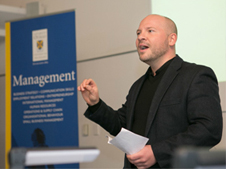 Good leadership is crucial for business success, but just what makes a good leader, and what does evolution have to do with it?
Good leadership is crucial for business success, but just what makes a good leader, and what does evolution have to do with it?
Dr Brian Spisak from the University of Otago's Department of Management researches how and why leadership develops in large-scale social networks, blending social and organisational psychology with the study of biological and cultural evolution. He incorporates this into his teaching of management for performance and responsible leadership at the University of Otago Business School.
Dr Spisak explains we share a common biological heritage, no matter what we do or where we are from.
Evolutional and human behaviour helps to explain why we think and act the way we do. This is based on the consistent pressures faced across the whole of our evolutionary history, such as the need to manage issues surrounding competition and cooperation within and between groups.
The biological sciences, for instance, provide insights into fundamental human tendencies, which help to clarify what adaptive responses are likely to occur under different organisational pressures, while the social sciences provide information about specific organisational and cultural environments.
He believes this blend of social and natural sciences represents the future of group dynamics research and is the foundation of a modern interpretation of organisational leadership.
From this perspective, Dr. Spisak argues that we can better describe issues like why society has difficulty transitioning to renewable resources, or why organisations tend to opt for short-term “low road” strategies.
Using an understanding of evolutionary dynamics, he develops models to solve problems like these.
Evolutional and human behavior in organisations
Dr Spisak has already applied this evolutionary perspective to understand intergroup conflict for the United States Office of Naval Research and NATO, analysing ways to build co-operative ties between peacekeeping troops on the ground and the local population.
That work can be extrapolated to commerce – and is being applied to group processes such as innovation, sustainability, and intergroup dynamics to make modern organisations more effective.
For instance, greater understanding of group dynamics and conflict could better guide mergers and acquisitions, which have 50 to 70 percent failure rate. “There is a balancing act in organisations between self-interests and group interests, and leadership needs to regulate this tension to maintain organizational fitness – these studies help to identify what leadership qualities are needed.”
Dr Spisak has contributed to Evolutionary Psychology in the Business Sciences, one of the first academic books on how to apply evolutionary psychology in the business sciences. He examined evolutionary behavioral sciences alongside specific business contexts including marketing, consumer behavior, negotiations, executive leadership and business ethics.
He has also been studying niche construction—the process where individuals modify their own and each other's environments, through their activities, interactions and choices. The output of this research has led to one of the first publications on this topic in the Academy of Management Review – a leading academic journal in the field of management. In addition, Dr Spisak's work has also appeared in leading psychological journals as well as multidisciplinary outlets.
He finds that the true value in studying evolution and human behaviour is the ability to connect academics from various fields to think about big questions and to provide novel ways of looking at society to better engage the academic curiosity of students.








